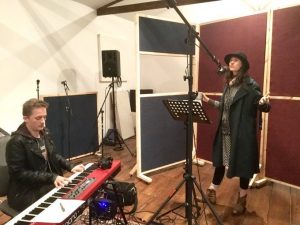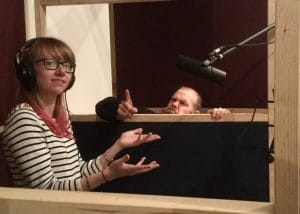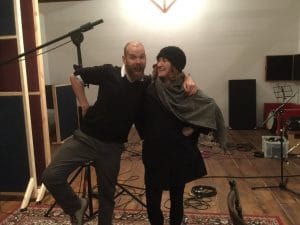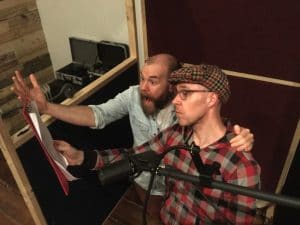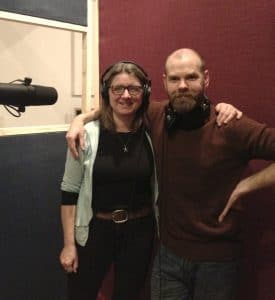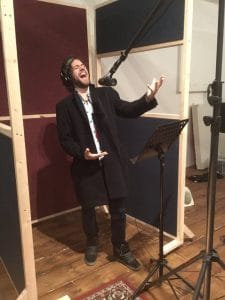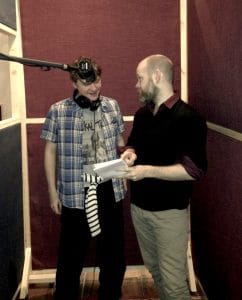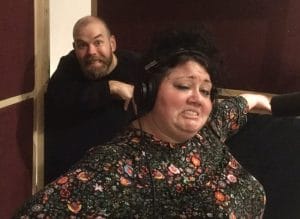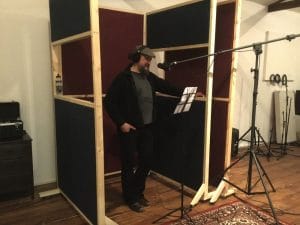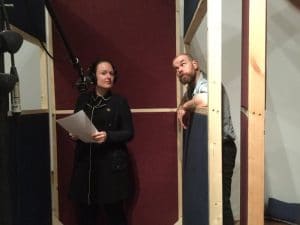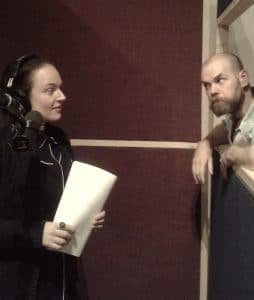 There’s a lot of energy and personality coming out of the orchestra pit but if the vocalists can’t deliver then all the power in a song evaporates before getting anywhere near the audience.
There’s a lot of energy and personality coming out of the orchestra pit but if the vocalists can’t deliver then all the power in a song evaporates before getting anywhere near the audience.
I was told by a few people that I should only work with singers from a musical theatre background, that there is a certain kind of delivery one expects from performers in this genre, that vocalists in the rock/folk/indie/pop sectors don’t have the right kind of push.
But part of my reason for wanting to write my own musical was that all too often I get tired of that “musical theatre” delivery, finding the wide eyes and bright teeth to be a distraction from the nuances of real emotion, like the violent glare of approaching dusk on a Northward drive in Autumn. That kind of projection is essential in a theatre context where a whole auditorium needs to feel included, but on a soundtrack album it can sometimes be a bit much. What I really wanted was a mixture of tones – the more theatrical character-driven numbers being handled by actors while the standalone, subtler tracks are performed by vocalists from the recorded industry. And in such moments where that dividing line gets blurred (which happens, admittedly, rather a lot) we would all just have to stray a little out of our respective comfort zones.
I also wanted to work with friends: people I knew I could get on with during a very high-pressure schedule. I’ve been touring for a long time, meeting artists from all over the place – the opportunity to get so many of them involved in one project does not occur often. So there are longtime collaborators like Bridie Jackson, Liz Green, Ríoghnach Connolly, Felix Hagan, Laurien Schreuder (Snowapple), Richard Barry and Becca Williams. Then people who I’d known for a while but never recorded with, like Tom Hingley (Inspiral Carpets), Natasha Hodgson (Kill The Beast) and even my old English teacher Elizabeth Lewis Williams. Finally there were people I knew a little bit but had never had the chance to work with, such as Tom Robinson (Tom Robinson Band, BBC 6 Music), Ian Bermingham (from Dublin band The Eskies), Mark McGhee (from Glaswegian band Girobabies) and the actor Jami Reid Quarrell (who plays Davros’ reptilian assistant Colony Sarff in Doctor Who, but is actually very pleasant in real life).
In the usual course of musical theatre soundtracks the cast have months of preparation and rehearsal before recording the songs. They not only know the material inside out, they have the entire character arc in their head (plus every gesture and inflection that goes along with it). In the case of Jocasta, however, the performers’ preparation time could be counted in hours rather than weeks – each one found themselves lumbered with an exercise of such concentrated magnitude, that sometimes the experience was both emotionally and physically exhausting.
- Laurien Schreuder accompanied by Fran Lydiatt
- Becca Williams
- Natasha Hodgson
- Tom Hingley
- Liz Green
- Jami Reid-Quarrell
It was interesting witnessing the different methods in approaching this task. The actors would just launch themselves straight in then await my notes on which way to take the performance. In my own experience of theatre acting some directors only really know what they want once they’ve seen a performer do what they don’t want, so there’s no embarrassment in missing the mark; trial and error is just part of the process. In the case of the singer-songwriters there tended to be a longer warming-up period, of shedding that natural self-consciousness and bending idiosyncratic performance styles into line with a whole new set of character traits. Often a big chunk of time would be taken up with releasing a grip on the importance of melody (or “getting it technically right”) in favour of trying to locate the emotional crux of the fictional moment. Sometimes the difficulty came from having to (rather perversely) sing badly rather than better – a deeply unnatural task for anyone used to normal studio recording.
The voice is a very personal thing. It is an instrument played inside us, nothing can be more intimate than that. For some it is a tool for expression, for others it is the very essence of self-expression. Taking direction on how to deliver a song can be difficult, even hurtful. The line between direction and criticism is a precariously thin one. My greatest fear in all this was to burn the bridges of friendship by being insensitive (or just plain annoying) with my direction of performers. I’ve been living with these songs and characters in my head for a long time, so I have a very clear idea of how I think they should sound and, though I like to think I am flexible and open-minded, when it comes to the performance of my work I suspect I veer somewhat towards benevolent dictator. Of course, a certain amount of compromise/rethinking is inevitable (even desirable) when working with such a wide range of performers – everyone has different ways of approaching language/rhythm – so I hope what we have at the end of all this is a marriage of artistic intent, of real creative teamwork. The emphasis there is very much on work though. The question “would you like to sing on my musical soundtrack?” probably seemed like a relatively fun and throwaway request to most of these people (as it did to me at first) – little did they (and I) know the ordeal I was about to put them through.
“Try and sing as though you’re spontaneously plucking the words out of the air… no, the words are hotter than that… hotter!”
“…Really creep up on that rhyme… then pounce on it like a cat.”
“The first half of the couplet is the climb up, the second half is the slide down…”
“Imagine you’ve just woken up after a mid-meal snooze… now add a bit of indigestion to the delivery.”
“Treat this line as though it smells REALLY bad…”
“Can you, sort of, hiccup the end of that verse?”
“Don’t worry so much about that half of the word, it’s more of a syllabic balancing aid, make sure you land on the next beat, think of it as musical parkour…”
“Trust me, those syllables do all fit, you just have to be merciless with them. Imagine you’re punching a lexicon while singing.”
These are just a few of the “helpful” suggestions I’ve meted out whilst directing the vocal sessions. It’s a wonder they didn’t all just walk out.
Actually the person who seems the most scarred by all this is engineer Dan. Too often I’ve used him as an illustration aid. For instance, there’s a song Bridie sings in the second act called “Keeping It Together” – it’s the moment her character realises she’s been in a mentally abusive relationship for years.
“Treat every line like a physical shove, each one is the recollection of a time when you yourself have been pushed down, now all that thwarted energy is ricocheting back up again and you’re beating this scumbag husband into a corner with his own history… I’ll demonstrate…” (I roll up my sleeves) “Dan, would you stand next to me please?”
Dan looks over from the mixing desk like a whipped dog. “Oh no, not again…”
- Elizabeth Lewis Williams
- Felix Hagan
- Mark McGhee
- Ríoghnach Connolly
- Richard Barry
- Bridie Jackson
BACK TO MAIN JOCASTA PAGE
Read an article about adapting the myth
Read an article about composing the songs
Read an article about writing the script
Read an article about the studio team
Read an article about recording the rhythm section
Read an article about the orchestration
Read an article about recording the crowd vocals
Read an article about mixing the album
View photos from the Lowry showcase event
View rehearsal photos
Project Overview / Final Thoughts
And here’s a piece about being funded by Arts Council England

